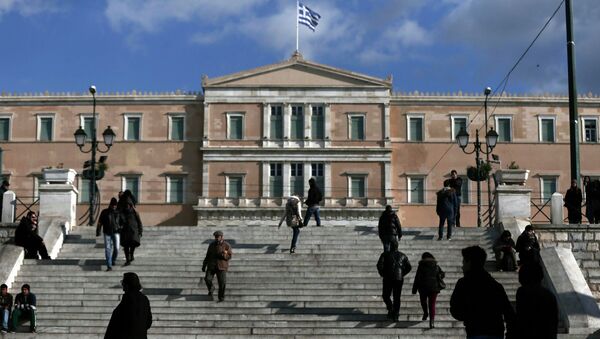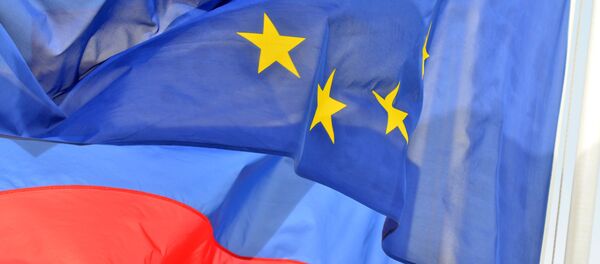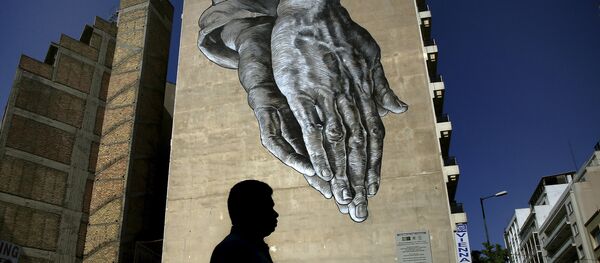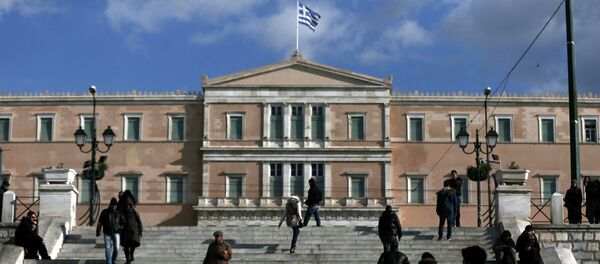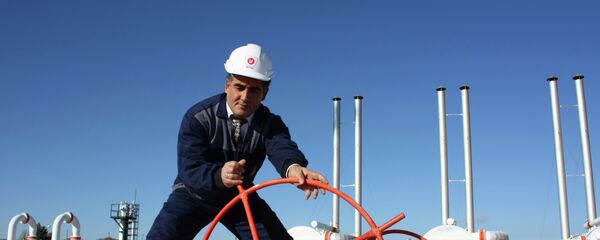"During the current economic crisis in Greece representatives of the business community are very eagerly looking toward working with their partners abroad and in this sense the Eurasian Union is one of the most advantageous regions to work with," Kouvelis, who is also a former Greek deputy foreign minister, said.
He explained that the EEU would become a very important economic player in the years to come, because of the more than 280 million people it brings together and its geographical location.
"Greece is in a very advantageous geographical position to work with the countries of the Eurasian Union," Kouvelis added.
Kouvelis said that Greek entrepreneurs are particularly interested in "food and food processing, energy, and renewable and new forms of energy as well, hotel and hotel management and tourism, transport, logistics, pharmaceuticals, as well as air transport and construction".
The Eurasian Economic Union, which comprises Armenia, Belarus, Kazakhstan, Kyrgyzstan and Russia, is an international organization, which aims to achieve the free flow of goods and services between its member nations.
EU to Review Anti-Russia Sanctions Policy, Focus on Cooperation
The European Union will review its sanctions policy toward Russia soon, and focus on cooperation instead, former Greek Deputy Foreign Minister Spyros Kouvelis told Sputnik.
"The EU will gradually start reviewing its position towards the sanctions… I believe it is not a thing that will last for a very long time," Kouvelis said.
"The time of the crisis would necessitate the opposite, i.e. the development of collaboration," he added.
According to Kouvelis, the sanctions regime "hampers the economy of not only the Russian Federation, but also the European Union" as it "does not serve the building of bridges between two very important potential partners, like the European Union and the Russian Federation".
Greeсe’s Election Result Not to Affect Ties With Russia
The shift towards Russia and the Eurasian Economic Union (EEU) that Greece has adopted in recent months will remain unaffected by any change in government, Kouvelis told Sputnik.
Former Greek Prime Minister Alexis Tsipras announced his resignation earlier this month to pave the way for early elections in a bid to secure popular support for his stance on the new 86-billion-euro ($96 billion at the current exchange rate) bailout package with the country's creditors. The vote is due to take place on September 20.
"Like it or not, I believe the Greek government, whatever it is, will continue to support the Greek business sector in developing its further collaboration with the Russian Federation and the Eurasian Union," Kouvelis said.
He added that the Greek business community would still be "looking very strongly for opportunities" to work with Eurasian Economic Union member-states.
"The actual fact remains: Greece is understandably highly interested in working with the Eurasian Union."
In particular, during the 2015 St. Petersburg International Economic Forum (SPIEF,) then-Greek Energy Minister Panagiotis Lafazanis and his Russian counterpart Alexander Novak signed a memorandum on the construction of the extension of the Turkish Stream gas pipeline through Greece.
Greece Faces Prolonged Period of Non-Development After Bailout
Greece faces a prolonged period of low economic development due to the bailout programs signed with its international creditors, Kouvelis told Sputnik.
On August 14, the Eurogroup approved the third bailout package for Athens in exchange for more austerity reforms that include tax increases and pension cuts.
"Because of the two previous agreements [with the international creditors] and the one that was signed by this government recently, Greece will face a quite prolonged period of non-development. We will have quite a prolonged period of low outcome of the Greek economy."
"That could also be a source of remittances for the Greek economy," Kouvelis concluded.
Greece is currently experiencing a deep economic crisis, struggling to repay its multi-billion debt to international creditors, including the European Central Bank, the International Monetary Fund and some eurozone countries.
